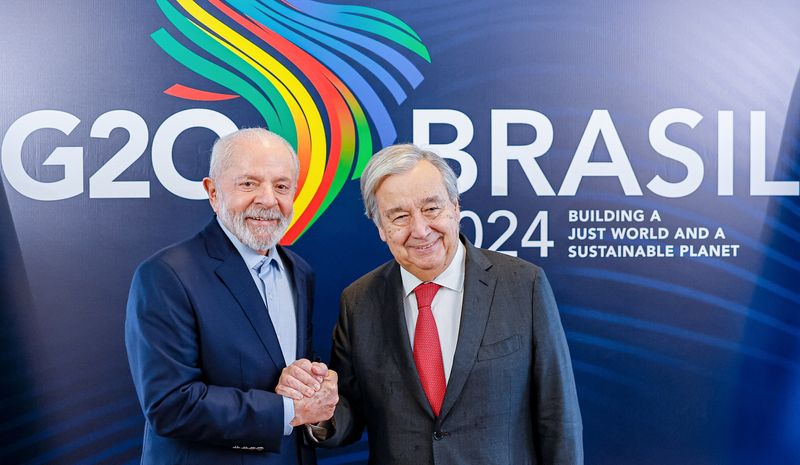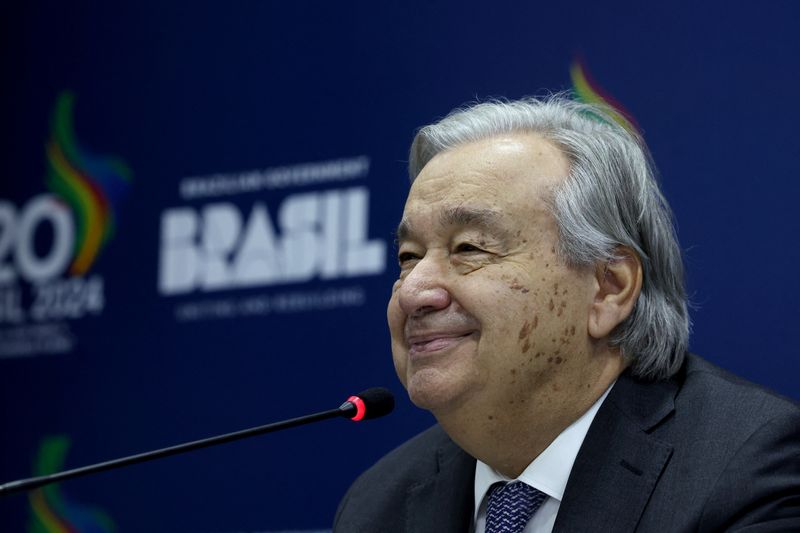
By Jake Spring and Lisandra Paraguassu
RIO DE JANEIRO (Reuters) – Diplomatic tensions over global warming will take center stage at the G20 summit in Brazil this week, as negotiators at U.N. talks in Azerbaijan hit an impasse on climate finance that they hope leaders of the world’s 20 major economies can break.
Heads of state arriving in Rio de Janeiro on Sunday for the G20 summit will spend Monday and Tuesday addressing issues from poverty and hunger to the reform of global institutions. Still, the ongoing U.N. climate talks have thrown a spotlight on their efforts to tackle global warming.
While the COP29 summit in Baku, Azerbaijan, is tasked with agreeing a goal to mobilize hundreds of billions of dollars for climate, leaders of the Group of 20 major economies half a world away in Rio are holding the purse strings.
G20 countries account for 85% of the world’s economy and are the largest contributors to multilateral development banks helping to steer climate finance. They are also responsible for more than three-quarters of greenhouse gas emissions worldwide.
“The spotlight is naturally on the G20. They account for 80 percent of global emissions,” U.N. Secretary General Antonio Guterres told reporters in Rio de Janeiro. He expressed concern about the state of the COP29 talks in Baku and called on G20 leaders to do more to fight climate change.
“Now is the time for leadership by example from the world’s largest economies and emitters,” Guterres said.
Reaching agreement may only get tougher with the return to power of U.S. President-elect Donald Trump, who is reportedly preparing to again pull the United States out of the Paris climate accord.
Trump is also planning to roll back landmark climate legislation passed by outgoing President Joe Biden, who visited the Amazon (NASDAQ:AMZN) rainforest when he made a stop there on Sunday on his way to Rio.
U.N. climate chief Simon Stiell wrote a letter to G20 leaders on Saturday imploring them to act on climate finance, including boosting grants for developing nations and advancing reforms of multilateral development banks.
However, the same fights that have plagued COP29 since it began last week are spilling over into G20 negotiations, according to diplomats close to the Rio talks.
COP29 must set a new goal for how much financing should be directed from developed countries, multilateral banks and the private sector to developing nations. Economists told the summit it should be at least $1 trillion.
Wealthy countries, especially in Europe, have been saying that an ambitious goal can only be agreed if they expand the base of contributors to include some of the richer developing nations, such as China and major Middle Eastern oil producers.
On Saturday, discussions of a G20 joint statement in Rio snagged on the same issue, with European nations pushing for more countries to contribute and developing countries such as Brazil pushing back, diplomats close to the talks told Reuters.
The success of not only COP29 but also the next U.N. climate summit, COP30 hosted in Brazil next year, hinges on a breakthrough on climate finance.
A centerpiece of Brazil’s COP30 strategy is “Mission 1.5,” a drive to keep alive the Paris Agreement target of limiting global warming to 1.5 degrees Celsius. The U.N. estimates that current national targets would cause temperatures to rise by at least 2.6 degrees C.

Developing countries argue they can only raise their targets for emissions reductions if rich nations, who are the main culprits for climate change, foot the bill.
“It is technically possible to meet the goal of 1.5 degrees Celsius, but only if a G20-led, massive mobilization to cut all greenhouse gas emissions … is achieved,” said Bahamas Prime Minister Philip Davis at COP29 last week.
This post is originally published on INVESTING.



